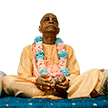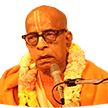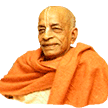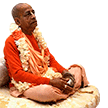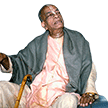Vedic Civilization - an essential subject: Difference between revisions
(Created page with "Category:Essential Subjects <!----------------------- edit below this line -----------------------> <!------------------------ begin introduction text --------------------...") |
(Vanibot #0041: Moves Choose Another box to the end) |
||
| Line 2: | Line 2: | ||
<!----------------------- edit below this line -----------------------> | <!----------------------- edit below this line -----------------------> | ||
<!------------------------ begin introduction text ------------------------> | <!------------------------ begin introduction text ------------------------> | ||
Unless there is control over our mind, it will dictate us to try something new: "Do like this." A Bengali poet has sung a song, ek ta nūtana kichu koro: "Do something new." This is the mind's business. He is not satisfied with old things. Nūtana kichu koro. The whole material world is like that. Ei nūtana kichu koro: "Do something new," and become implicated. We are not satisfied with old things. | |||
Srila Prabhupada's books, lectures, conversations and letters offer a comprehensive presentation of this essential subject as seen in the Vaniquotes '''[[Vaniquotes:Category:Vedic Civilization|Vedic Civilization]]''' category. An introduction from his books is given below in the following | There is an English proverb - "yielding to the new." But the Vedic civilization is "Do not try to invent some new order. That will create disturbance. Be satisfied with whatever you have got by nature's way, be satisfied. Don't spoil your time. Save time for Kṛṣṇa consciousness." That is Vedic civilization. That is the purpose of valuable life. The whole purpose of following Vedic civilization is to understand Kṛṣṇa. Vedic civilization is natural life. It offers us all the knowledge from the śāstras and does not recommend that one wastes their valuable life engaged in material happenings and instead encourages one's spiritual advancement. | ||
Srila Prabhupada's books, lectures, conversations and letters offer a comprehensive presentation of this essential subject as seen in the Vaniquotes '''[[Vaniquotes:Category:Vedic Civilization|Vedic Civilization]]''' category. An introduction from his books is given below in the following 10 quotes. | |||
<!-------- end introduction text and don't touch next three lines ---------> | <!-------- end introduction text and don't touch next three lines ---------> | ||
---- | ---- | ||
== Quotes from Srila Prabhupada's books == | == Quotes from Srila Prabhupada's books == | ||
<!----------------- edit quote boxes below this line -----------------> | <!----------------- edit quote boxes below this line -----------------> | ||
{{VaniQuotebox| | {{VaniQuotebox|According to Vedic civilization, when a child is born in the family of a brahmana, the birthday ceremony, known as jata-karma, is first performed, and then other ceremonies are also gradually performed|According to Vedic civilization, when a child is born in the family of a brāhmaṇa, the birthday ceremony, known as jāta-karma, is first performed, and then other ceremonies are also gradually performed. But when this vāmana-rūpa appeared in the form of a vaṭu, or brahmacārī, His sacred thread ceremony was also performed immediately. '''(Śrīmad-Bhāgavatam 8.18.13)'''}} | ||
{{VaniQuotebox|As far as we, the followers of Vedic civilization, are concerned, we accept the Vedic history of the whole universe, which consists of different planetary systems|There are various classes of men in the world who speak of God in different ways, but according to the Vedic literatures and according to the great ācāryas, the authorized persons versed in the knowledge of God in all ages, like ācāryas Śaṅkara, Rāmānuja, Madhva, Viṣṇu Svāmī, Lord Caitanya and all their followers by disciplic succession, all unanimously agree that Kṛṣṇa is the Supreme Personality of Godhead. As far as we, the followers of Vedic civilization, are concerned, we accept the Vedic history of the whole universe, which consists of different planetary systems. '''(Kṛṣṇa Book, Preface)'''}} | |||
{{VaniQuotebox|Even if one is not able to go back to Godhead in one life, the Vedic civilization at least gives one the opportunity to be promoted to the higher planetary systems, where the demigods live, and not glide down again to animal life|After giving up the body, one who knows Kṛṣṇa in truth does not come back again to this world to accept a material body, but he goes back home, back to Godhead. This knowledge is in the śāstras, and people should be given the opportunity to understand it. Even if one is not able to go back to Godhead in one life, the Vedic civilization at least gives one the opportunity to be promoted to the higher planetary systems, where the demigods live, and not glide down again to animal life. '''(Caitanya-caritāmṛta, Ādi-līlā 9.43)'''}} | |||
{{VaniQuotebox| | {{VaniQuotebox|Generally according to Vedic civilization, the wife is trained to be satisfied in all conditions, and the husband, according to Vedic instruction, is required to please the wife with sufficient food, ornaments and clothing|Generally, according to Vedic civilization, the wife is trained to be satisfied in all conditions, and the husband, according to Vedic instruction, is required to please the wife with sufficient food, ornaments and clothing. Then, if they are satisfied with their mutual dealings, good children are born. In this way the entire world can become peaceful, but unfortunately in this age of Kali there are no ideal husbands and wives; therefore unwanted children are produced, and there is no peace and prosperity in the present-day world. '''(Śrīmad-Bhāgavatam 4.1.6)'''}} | ||
{{VaniQuotebox| | {{VaniQuotebox|In the history of the human race, the Aryan family is considered to be the most elevated community in the world because it adopts the Vedic civilization. The Aryan family is distributed all over the world and is known as Indo-Aryan|In the history of the human race, the Āryan family is considered to be the most elevated community in the world because it adopts the Vedic civilization. The Āryan family is distributed all over the world and is known as Indo-Āryan. In prehistoric days all of the members of the Āryan family followed the Vedic principles, and therefore they became spiritually advanced. '''(Śrīmad-Bhāgavatam 4.20.26)'''}} | ||
{{VaniQuotebox| | {{VaniQuotebox|In Vedic civilization a man is taught from the beginning of his life to become a brahmacari, then an ideal grhastha, then vanaprastha, then sannyasi, and the wife is taught just to follow the husband strictly in all conditions of life|In Vedic civilization a man is taught from the beginning of his life to become a brahmacārī, then an ideal gṛhastha, then vānaprastha, then sannyāsī, and the wife is taught just to follow the husband strictly in all conditions of life. After the period of brahmacarya, a man accepts a householder's life, and the woman is also taught by her parents to be a chaste wife. Thus when a girl and boy are united, both are trained for a life dedicated to a higher purpose. '''(Śrīmad-Bhāgavatam 4.23.20)'''}} | ||
{{VaniQuotebox| | {{VaniQuotebox|Real opulence is supplied by natural gifts such as gold, silver, pearls, valuable stones, fresh flowers, trees and silken cloth. Thus the Vedic civilization recommends opulence and decoration with these natural gifts of the Supreme Personality of Godhead|Real opulence is supplied by natural gifts such as gold, silver, pearls, valuable stones, fresh flowers, trees and silken cloth. Thus the Vedic civilization recommends opulence and decoration with these natural gifts of the Supreme Personality of Godhead. Such opulence immediately changes the condition of the mind, and the entire atmosphere becomes spiritualized. King Pṛthu's capital was decorated with such highly opulent decorations. '''(Śrīmad-Bhāgavatam 4.21.1)'''}} | ||
{{VaniQuotebox| | {{VaniQuotebox|The Vedic civilization existed millions and millions of years ago. It existed since the creation of this universe, and it included arrangements all over the universe with all the modern amenities and even more|Modern scientists and philosophers foolishly explain that there was no civilization prior to three thousand years ago, but the statement of this verse nullifies such whimsical judgments. The Vedic civilization existed millions and millions of years ago. It existed since the creation of this universe, and it included arrangements all over the universe with all the modern amenities and even more. '''(Śrīmad-Bhāgavatam 7.8.33)'''}} | ||
{{VaniQuotebox| | {{VaniQuotebox|The Vedic way of life is the progressive march of the civilization of the Aryans. The Aryans are progressive in Vedic civilization. The Vedic civilization's destination is to go back to Godhead|The Vedic way of life is the progressive march of the civilization of the Āryans. The Āryans are progressive in Vedic civilization. The Vedic civilization's destination is to go back to Godhead, back home, where there is no birth, no death, no old age and no disease. The Vedas direct everyone not to remain in the darkness of the material world but to go towards the light of the spiritual kingdom far beyond the material sky. '''(Śrīmad-Bhāgavatam 1.18.45)'''}} | ||
{{VaniQuotebox| | {{VaniQuotebox|The whole purpose of Vedic civilization and of reading the Vedas is to attain the perfect stage of devotional service in the human form of life|The whole purpose of Vedic civilization and of reading the Vedas is to attain the perfect stage of devotional service in the human form of life. According to the Vedic system, therefore, from the very beginning of life the brahmacarya system is introduced so that from one's very childhood—from the age of five years—one can practice modifying one's human activities so as to engage perfectly in devotional service. '''(Śrīmad-Bhāgavatam 7.6.1)'''}} | ||
<!----------------- edit quote boxes above this line -----------------> | <!----------------- edit quote boxes above this line -----------------> | ||
| Line 31: | Line 37: | ||
'''Vedic Civilization - [[Vaniquotes:Category:Vedic Civilization|explore more within this category]]'''. | '''Vedic Civilization - [[Vaniquotes:Category:Vedic Civilization|explore more within this category]]'''. | ||
{{EsentialSubjectTotal}} | {{EsentialSubjectTotal}} | ||
<div style="float:left;"> | |||
{{EssentialSubjectnav}} | |||
</div> | |||
__NOTOC__ | __NOTOC__ | ||
__NOEDITSECTION__ | __NOEDITSECTION__ | ||
Latest revision as of 18:06, 22 November 2020
Unless there is control over our mind, it will dictate us to try something new: "Do like this." A Bengali poet has sung a song, ek ta nūtana kichu koro: "Do something new." This is the mind's business. He is not satisfied with old things. Nūtana kichu koro. The whole material world is like that. Ei nūtana kichu koro: "Do something new," and become implicated. We are not satisfied with old things.
There is an English proverb - "yielding to the new." But the Vedic civilization is "Do not try to invent some new order. That will create disturbance. Be satisfied with whatever you have got by nature's way, be satisfied. Don't spoil your time. Save time for Kṛṣṇa consciousness." That is Vedic civilization. That is the purpose of valuable life. The whole purpose of following Vedic civilization is to understand Kṛṣṇa. Vedic civilization is natural life. It offers us all the knowledge from the śāstras and does not recommend that one wastes their valuable life engaged in material happenings and instead encourages one's spiritual advancement.
Srila Prabhupada's books, lectures, conversations and letters offer a comprehensive presentation of this essential subject as seen in the Vaniquotes Vedic Civilization category. An introduction from his books is given below in the following 10 quotes.
Quotes from Srila Prabhupada's books
Vedic Civilization - explore more within this category.
Vanipedia has now over 903 introductory articles compiled from Srila Prabhupada's books under the series titled Essential Subjects. All these articles can be seen in the Table of Content on the right side of this article and also here in this Umbrella Category. Browse through them to relish the breadth and depth of Srila Prabhupada's teachings - There is a subject for everyone.


